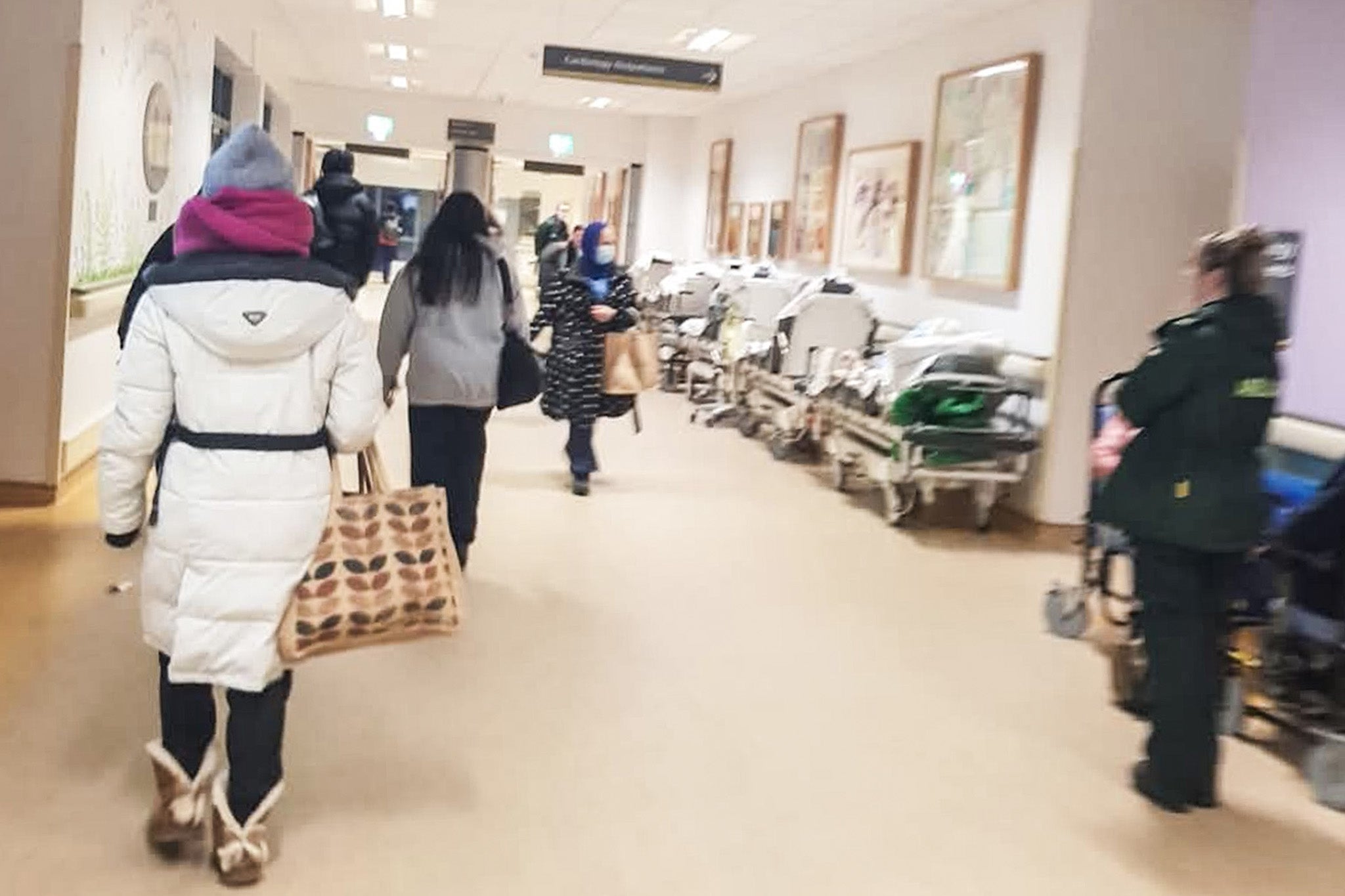
Nurses are being forced to care for patients in corridors, store rooms, car parks and toilets as a shocking new report lays bare how the current hospital crisis is costing lives.
Patients have been left dying in corridors as helpless medical staff have had no other place to put them, while some deaths have gone unnoticed for hours as staff struggle to manage overcrowded hospital wards during the winter flu surge.
The Royal College of Nursing (RCN) survey of more than 5,000 nurses from around the UK found nine in 10 (91.5 per cent) had delivered care in inappropriate settings such as corridors at least once a month, while nearly seven in 10 (66.8 per cent) were delivering care in unsuitable places every day.
The stark picture emerged as health secretary Wes Streeting said patients had been “let down” by the continued normalisation of corridor care and by ambulances taking hours to arrive – but could not promise there would be no treatment taking place in corridors next winter.
He said: “I want to be clear, I will never accept or tolerate patients being treated in corridors. It is unsafe, undignified, a cruel consequence of 14 years of failure on the NHS and I am determined to consign it to the history books.”
Mr Streeting revealed there were 53,000 NHS staff off sick in the first week of 2025 with flu, adding pressure to the health system.
But he added: “I cannot and will not promise that there won’t be patients treated in corridors next year. It will take time to undo the damage that has been done to our NHS.”
RCN general secretary and chief executive Professor Nicola Ranger said she had heard evidence that many patients were being put in chairs rather than on trolleys, and that the only available flat surface to perform CPR “was on the floor”.
“It has become just a normal way for nurses to look after patients: extra patients in front of vending machines, in front of fire escapes. It’s not normal … this has to be enough is enough,” she said. “This isn’t just a care issue. This is a safety issue.”

Asked whether she had any doubt it was costing lives, Prof Ranger said: “I have no doubt at all”.
Other shocking findings included:
An emergency department nurse, who spoke on the condition of anonymity due to the sensitive nature of the topic, said: “The risk of patients dying and not being noticed is very high. Everybody is stretched … things are being missed.
“It’s not because people want to miss them, it’s because the volume of work that they have to do means they can’t keep up with all of the tasks that need to be done.”
Prof Ranger said this wasn’t an issue of particular hospitals, but was a system-wide crisis.
“This needs government intervention,” she said. The RCN wants the government to take immediate action to improve acute care, including through publishing data on exactly how many patients are being cared for in these circumstances, and rebuilding the nursing workforce.
Prof Ranger said industrial action was “a last resort”, but warned nurses would not wait forever for change.
“What we do need to do is recognise, as well as a corridor care crisis, we have a nursing crisis in the UK, and my real concern is ... if we don’t sort that out, it will never get better for patients. And I feel, as do my members, extremely strongly about that,” she said.

Liberal Democrat health and social care spokesperson Helen Morgan MP said the report was “harrowing”.
“To think that patients are receiving desperately needed care in car parks and dying patients are being left to fend for themselves in corridors should make us sick to our stomachs,” she said.
Ms Morgan said the health secretary must produce an “emergency plan” to get more beds into hospitals and boost staffing numbers.
“The Conservative Party’s legacy of NHS neglect was beyond shameful but we now need to see ministers get their act together and finally take steps to bring an end to this catastrophic situation,” she said.
Nurses said the current crisis made them feel “ashamed” of the level of care they were able to provide and the sometimes dangerous nature of their work environments and added that they were actively looking to leave the NHS.
“Every day I look at new jobs,” the emergency nurse said. “Lots of my colleagues have already left and don’t intend to return.”
Another senior nurse said she was searching for “anything else”, despite the fact she loved nursing, because the impact on her family and mental health was too much.
England’s chief nursing officer, Duncan Burton, said he understood as a nurse how distressing it could be to be incapable of providing the best standard of care for patients.
“Increasing levels of demand have resulted in extreme pressures on services, particularly over recent months and one of the toughest winters the NHS has experienced,” he said.
“The impact this has on the experiences of patients and staff, as highlighted by the RCN report, should never be considered the standard to which the NHS aspires.
“That is why building a health service that is fit for the future is a key priority for the NHS and government, and the NHS is continuing to work hard to deliver improvements across urgent and emergency care for patients and our staff.”







